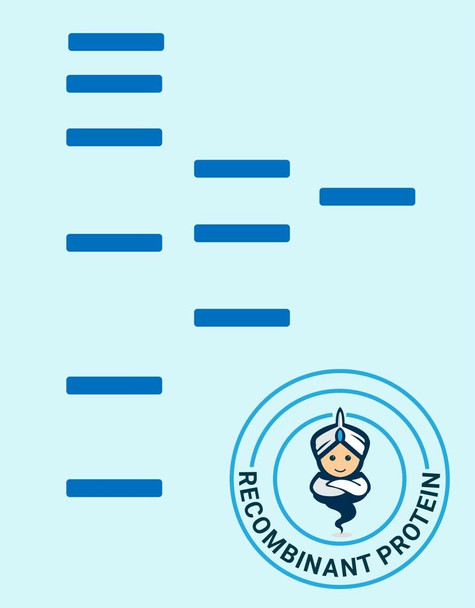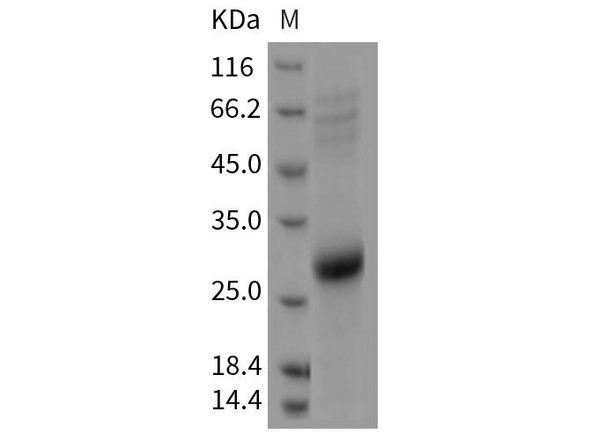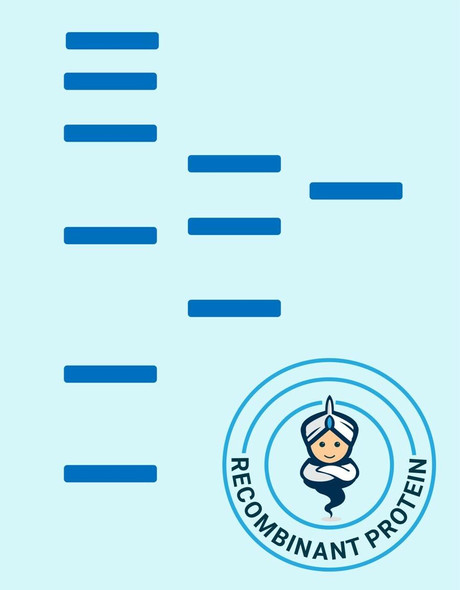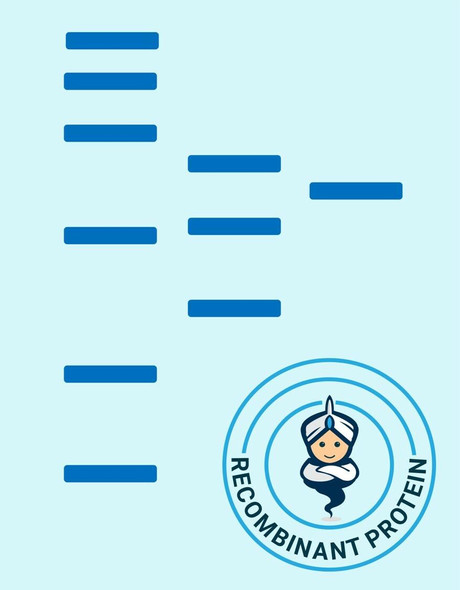Human TNFSF7 Recombinant Protein (RPPB1018)
- SKU:
- RPPB1018
- Product Type:
- Recombinant Protein
- Species:
- Human
- Uniprot:
- P32970
- Research Area:
- Cytokines
Description
| Product Name: | Human TNFSF7 Recombinant Protein |
| Product Code: | RPPB1018 |
| Size: | 20µg |
| Species: | Human |
| Target: | TNFSF7 |
| Synonyms: | CD70 Molecule, TNFSF7, CD27L, Tumor Necrosis Factor(Ligand) Superfamily, Member 7, Tumor Necrosis Factor Ligand Superfamily Member7, CD70 Antigen, CD27 Ligand, CD27LG, CD27-L, Surface Antigen CD70, Ki-24Antigen, CD70 antigen. |
| Source: | Escherichia Coli |
| Physical Appearance: | Sterile filtered colorless solution. |
| Formulation: | TNFSF7 protein solution (1mg/ml) containing 20mM Tris-HClbuffer (pH 8.0) and 10% glycerol. |
| Stability: | Store at 4°C if entire vial will be used within 2-4 weeks. Store, frozen at -20°C for longer periods of time. For long term storage it is recommended to add a carrier protein (0.1% HSA or BSA).Avoid multiple freeze-thaw cycles. |
| Purity: | Greater than 80% as determined by SDS-PAGE. |
| Amino Acid Sequence: | MGSSHHHHHHSSGLVPRGSH MGSQRFAQAQQQLPLESLGW DVAELQLNHT GPQQDPRLYW QGGPALGRSF LHGPELDKGQ LRIHRDGIYM VHIQVTLAICSSTTASRHHP TTLAVGICSP ASRSISLLRL SFHQGCTIAS QRLTPLARGD TLCTNLTGTL LPSRNTDETFFGVQWVRP |
CD70 also known as TNFSF7 is a cytokine which binds to CD27. TNFSF7takes part in T-cell activation as well as induces the proliferation ofcostimulated T-cells. Moreover, TNFSF7 enhances the generation of cytolyticT-cells. Among the diseases which are associated with TNFSF7: Include acutemyocarditis & Myocarditis.
TNFSF7 Human Recombinant produced in E.Coli is a single,non-glycosylated polypeptide chain containing 178 amino acids (39-193 a.a) andhaving a molecular mass of 19.5kDa.TNFSF7 is fused to a 23 amino acid His-tag at N-terminus& purified by proprietary chromatographic techniques.
| UniProt Protein Function: | CD70: Cytokine that binds to CD27. Plays a role in T-cell activation. Induces the proliferation of costimulated T-cells and enhances the generation of cytolytic T-cells. Belongs to the tumor necrosis factor family. |
| UniProt Protein Details: | Protein type:Membrane protein, integral; Cytokine Chromosomal Location of Human Ortholog: 19p13 Cellular Component: extracellular space; integral to plasma membrane; plasma membrane Molecular Function:protein binding; protease binding; cytokine activity; tumor necrosis factor receptor binding; receptor binding Biological Process: cell proliferation; cell-cell signaling; immune response; signal transduction |
| NCBI Summary: | The protein encoded by this gene is a cytokine that belongs to the tumor necrosis factor (TNF) ligand family. This cytokine is a ligand for TNFRSF27/CD27. It is a surface antigen on activated, but not on resting, T and B lymphocytes. It induces proliferation of costimulated T cells, enhances the generation of cytolytic T cells, and contributes to T cell activation. This cytokine is also reported to play a role in regulating B-cell activation, cytotoxic function of natural killer cells, and immunoglobulin sythesis. [provided by RefSeq, Jul 2008] |
| UniProt Code: | P32970 |
| NCBI GenInfo Identifier: | 21431837 |
| NCBI Gene ID: | 970 |
| NCBI Accession: | P32970.2 |
| UniProt Secondary Accession: | P32970,Q53XX4, Q96J57, B4DPR8, |
| UniProt Related Accession: | P32970 |
| Molecular Weight: | 193 |
| NCBI Full Name: | CD70 antigen |
| NCBI Synonym Full Names: | CD70 molecule |
| NCBI Official Symbol: | CD70�� |
| NCBI Official Synonym Symbols: | CD27L; CD27LG; TNFSF7�� |
| NCBI Protein Information: | CD70 antigen; CD27-L; CD27 ligand; Ki-24 antigen; surface antigen CD70; tumor necrosis factor ligand superfamily member 7; tumor necrosis factor (ligand) superfamily, member 7 |
| UniProt Protein Name: | CD70 antigen |
| UniProt Synonym Protein Names: | CD27 ligand; CD27-L; Tumor necrosis factor ligand superfamily member 7; CD_antigen: CD70 |
| Protein Family: | CD70 antigen |
| UniProt Gene Name: | CD70�� |
| UniProt Entry Name: | CD70_HUMAN |









